#karl böhm
Explore tagged Tumblr posts
Text
youtube
Mozart - Cavatina L'ho perduta by Barbara Vogel, soprano & the Orchestra of the German Opera of Berlin conducted by Karl Böhm.
Kaos by Paolo & Vittorio Taviani Father (Apa) by István Szabó
#Youtube#mozart#barbara vogel#karl böhm#paolo & vittorio taviani father#istván szabó#petits plaisirs sonores
16 notes
·
View notes
Text

Joseph Haydn
Symphonien Nr.92
Karl Bohm
0 notes
Text
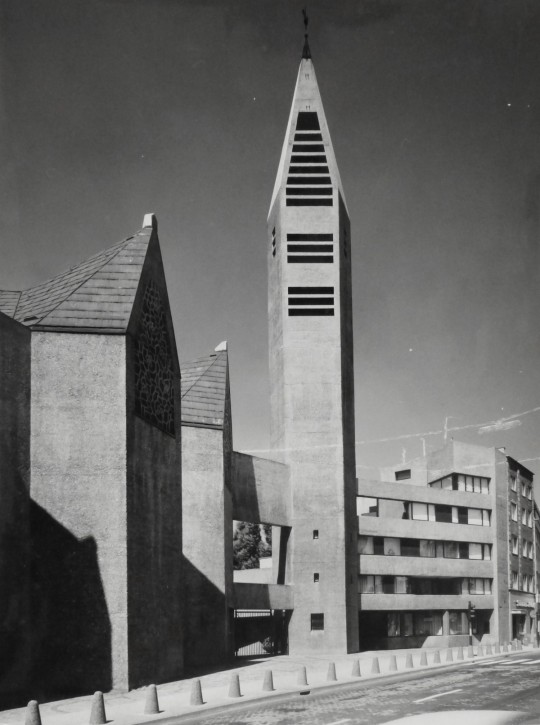
Church St Gertrud (1963-65) in Cologne, Germany, by Gottfried Böhm. Photo by Karl Hugo Schmölz.
#1960s#church#concrete#brutalism#brutalist#architecture#germany#nachkriegsarchitektur#nachkriegsmoderne#architektur#cologne#gottfried böhm
286 notes
·
View notes
Text
Opera on YouTube, Part 2
Le Nozze di Figaro (The Marriage of Figaro)
Glyndebourne Festival Opera, 1973 (Knut Skram, Ileana Cotrubas, Kiri Te Kanawa, Benjamin Luxon; conducted by John Pritchard; English subtitles)
Jean-Pierre Ponnelle studio film, 1976 (Hermann Prey, Mirella Freni, Kiri Te Kanawa, Dietrich Fischer-Dieskau; conducted by Karl Böhm; English subtitles) – Acts I and II, Acts III and IV
Tokyo National Theatre, 1980 (Hermann Prey, Lucia Popp, Gundula Janowitz, Bernd Weikl; conducted by Karl Böhm; Japanese subtitles)
Théâtre du Châtelet, 1993 (Bryn Terfel, Alison Hagley, Hillevi Martinpelto, Rodney Gilfry; conducted by John Eliot Gardiner; Italian subtitles)
Glyndebourne Festival Opera, 1994 (Gerald Finley, Alison Hagley, Renée Fleming, Andreas Schmidt; conducted by Bernard Haitink; English subtitles)
Zürich Opera House, 1996 (Carlos Chaussón, Isabel Rey, Eva Mei, Rodney Gilfry; conducted by Nikolaus Harnoncourt; English subtitles)
Berlin State Opera, 2005 (Lauri Vasar, Anna Prohaska, Dorothea Röschmann, Ildebrando d'Arcangelo; conducted by Gustavo Dudamel; French subtitles)
Salzburg Festival, 2006 (Ildebrando d'Arcangelo, Anna Netrebko, Dorothea Röschmann, Bo Skovhus; conducted by Nikolas Harnoncourt; English subtitles) – Acts I and II, Acts III and IV
Teatro all Scala, 2006 (Ildebrando d'Arcangelo, Diana Damrau, Marcella Orasatti Talamanca, Pietro Spagnoli; conducted by Gérard Korsten; English and Italian subtitles)
Salzburg Festival, 2015 (Adam Plachetka, Martina Janková, Anett Fritsch, Luca Pisaroni; conducted by Dan Ettinger; no subtitles)
Tosca
Carmine Gallone studio film, 1956 (Franca Duval dubbed by Maria Caniglia, Franco Corelli, Afro Poli dubbed by Giangiacomo Guelfi; conducted by Oliviero de Fabritiis; no subtitles)
Gianfranco de Bosio film, 1976 (Raina Kabaivanska, Plácido Domingo, Sherrill Milnes; conducted by Bruno Bartoletti; English subtitles)
Metropolitan Opera, 1978 (Shirley Verrett, Luciano Pavarotti, Cornell MacNeil; conducted by James Conlon; no subtitles)
Arena di Verona, 1984 (Eva Marton, Jaume Aragall, Ingvar Wixell; conducted by Daniel Oren; no subtitles)
Teatro Real de Madrid, 2004 (Daniela Dessí, Fabio Armiliato, Ruggero Raimondi; conducted by Maurizio Benini; English subtitles)
Royal Opera House, Covent Garden, 2011 (Angela Gheorghiu, Jonas Kaufmann, Bryn Terfel; conducted by Antonio Pappano; English subtitles)
Finnish National Opera, 2018 (Ausrinė Stundytė, Andrea Carè, Tuomas Pursio; conducted by Patrick Fournillier; English subtitles)
Teatro alla Scala 2019 (Anna Netrebko, Francesco Meli, Luca Salsi; conducted by Riccardo Chailly; Hungarian subtitles)
Vienna State Opera, 2019 (Sondra Radvanovsky, Piotr Beczala, Thomas Hampson; conducted by Marco Armiliato; English subtitles)
Ópera de las Palmas, 2024 (Erika Grimaldi, Piotr Beczala, George Gagnidze; conducted by Ramón Tebar; no subtitles)
Don Giovanni
Salzburg Festival, 1954 (Cesare Siepi, Otto Edelmann, Elisabeth Grümmer, Lisa della Casa; conducted by Wilhelm Furtwängler; English subtitles)
Giacomo Vaccari studio film, 1960 (Mario Petri, Sesto Bruscantini, Teresa Stich-Randall, Leyla Gencer; conducted by Francesco Molinari-Pradelli; no subtitles)
Salzburg Festival, 1987 (Samuel Ramey, Ferruccio Furlanetto, Anna Tomowa-Sintow, Julia Varady; conducted by Herbert von Karajan; no subtitles)
Teatro alla Scala, 1987 (Thomas Allen, Claudio Desderi, Edita Gruberova, Ann Murray; conducted by Riccardo Muti; English subtitles)
Peter Sellars studio film, 1990 (Eugene Perry, Herbert Perry, Dominique Labelle, Lorraine Hunt Lieberson; conducted by Craig Smith; English subtitles)
Teatro Comunale di Ferrara, 1997 (Simon Keenlyside, Bryn Terfel, Carmela Remigio, Anna Caterina Antonacci; conducted by Claudio Abbado; no subtitles) – Act I, Act II
Zürich Opera, 2000 (Rodney Gilfry, László Polgár, Isabel Rey, Cecilia Bartoli; conducted by Nikolaus Harnoncourt; English subtitles)
Festival Aix-en-Provence, 2002 (Peter Mattei, Gilles Cachemaille, Alexandra Deshorties, Mirielle Delunsch; conducted by Daniel Harding; no subtitles)
Teatro Real de Madrid, 2006 (Carlos Álvarez, Lorenzo Regazzo, Maria Bayo, Sonia Ganassi; conducted by Victor Pablo Pérez; English subtitles)
Festival Aix-en-Provence, 2017 (Philippe Sly, Nahuel de Pierro, Eleonora Burratto, Isabel Leonard; conducted by Jérémie Rohrer; English subtitles)
Madama Butterfly
Mario Lanfranchi studio film, 1956 (Anna Moffo, Renato Cioni; conducted by Oliviero de Fabritiis; no subtitles)
Jean-Pierre Ponnelle studio film, 1974 (Mirella Freni, Plácido Domingo; conducted by Herbert von Karajan; English subtitles)
New York City Opera, 1982 (Judith Haddon, Jerry Hadley; conducted by Christopher Keene; English subtitles)
Frédéric Mitterand film, 1995 (Ying Huang, Richard Troxell; conducted by James Conlon; English subtitles)
Arena di Verona, 2004 (Fiorenza Cedolins, Marcello Giordani; conducted by Daniel Oren; Spanish subtitles)
Sferisterio Opera Festival, 2009 (Raffaela Angeletti, Massimiliano Pisapia; conducted by Daniele Callegari; no subtitles)
Vienna State Opera, 2017 (Maria José Siri, Murat Karahan; conducted by Jonathan Darlington; no subtitles)
Wichita Grand Opera, 2017 (Yunnie Park, Kirk Dougherty; conducted by Martin Mazik; English subtitles)
Teatro San Carlo, 2019 (Evgenia Muraveva, Saimir Pirgu; conducted by Gabriele Ferro; no subtitles)
Rennes Opera House, 2022 (Karah Son, Angelo Villari; conducted by Rudolf Piehlmayer; French subtitles)
#opera#complete performances#youtube#le nozze di figaro#the marriage of figaro#tosca#don giovanni#madama butterfly#madame butterfly#wolfgang amadeus mozart#giacomo puccini
93 notes
·
View notes
Text

A silver-gilt and enamel nef for spices, by Karl Böhm or Karl Bender, Vienna, late 19th century
84 notes
·
View notes
Text

ERICH KLEIBER , Birthday (Vienna , 5 August 1890 - Zurich ,27 January 1956) . Great conductor being part of the "Golden Generation of Conductors" with Bruno Walter , Otto Klemperer , Wilhelm Furtwängler, Hans Knappertsbusch ,Clemens Krauss and Karl Böhm ; he conducted the greatest orchestras ( Berlin Opera ,La Scala, Covent Garden , Teatro Colon...) .He will remain famous for the unique recordings of "Le Nozze di Figaro" (Mozart) and "Tristan und Isolde" (Richard Wagner). His engagement against the Nazism forced him to fly away from Europe in the 30s. And of course he's the father of Carlos Kleiber (who is on the picture young). Photo : Ellinger / Jüdisches Museum ,Wien / Salzburger Festspiele 1935.
3 notes
·
View notes
Photo
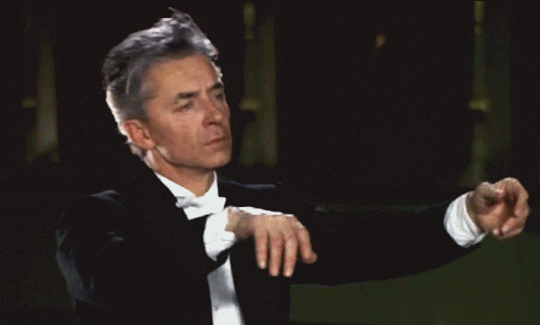
Those who have achieved all their aims probably set them too low.
- Herbert von Karajan
The Soprano Christa Ludwig described him as ‘Le bon Dieu’, while scores of musicians, reviewers and listeners have long regarded him as simply untouchable in the art of conducting. There was, however, much about Herbert von Karajan that was distinctly ungodlike. Ruthlessly ambitious as a young man and grimly autocratic in his later years, his life story is marked by bitter rivalries, feuds and, most notoriously, membership of the Nazi party.
But then, just listen to the results. It’s fascinating to look at the career, the controversy and the achievements of a conductor who still intrigues fans and detractors like no other musician long after his death.
The early career of Herbert von Karajan continues to be swathed in controversy.
Was he an ardent Nazi or an ambitious opportunist? If he was a zealous party member, should we revere his recordings as much as we do? To what extent should any moral accountability weigh against Karajan’s musical achievement? And how much latitude can we extend to people who have artistically given so generously?
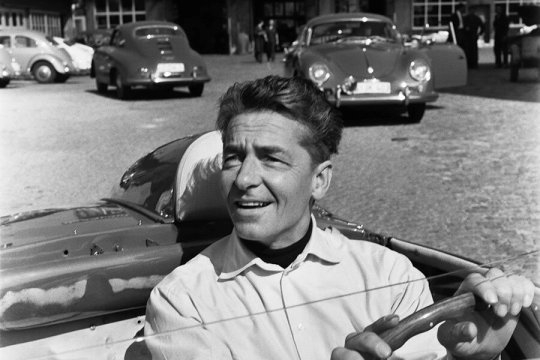
Karajan is not alone in occupying this uncomfortable situation during this era. Similar debate surrounds Richard Strauss, Carl Orff and Karl Böhm. Indeed, Wagner also evokes hostility in certain quarters with regard to his racial sentiments.
When Adolf Hitler swept to power in January 1933, the 24-year-old Austrian Herbert von Karajan had already notched up nearly four seasons as an up-and-coming opera conductor in the South German city of Ulm.
Born in Salzburg in 1908 into a prosperous family, he had demonstrated gifts as a pianist and conductor while studying in Vienna. After graduation, his debut orchestral concert with the Salzburg Mozarteum Orchestra in January 1929, featuring works by R Strauss, Mozart and Tchaikovsky, caused a local sensation and helped to secure him the contract in Ulm.
Karajan seized on the opportunity to learn his trade in Ulm and cut his teeth on much of the operatic repertory from Mozart and Beethoven to Puccini and R . Strauss, including the opera Schwanda der Dudelsacker by the Czech Jewish composer Jaromir Weinberger.
Yet, after the Nazi take-over, Karajan’s future wasn’t assured.
In early 1933, German operatic life was thrown into turmoil as the regime hounded out musicians that were deemed politically and racially unacceptable, and also pursued a protectionist policy to limit employment for non-Germans.
Against this context, Karajan’s decision to join the Nazi Party in Salzburg in April 1933 should be understood as an opportunistic move which was probably designed to safeguard his position at Ulm. Whether it also signalled enthusiasm for Nazi policy is open to speculation, though he no doubt hoped that the strong-arm methods of the Nazis would bring cultural stability to Germany.
Karajan retained his Ulm job for a further season, during which he expanded his repertory to include a praised account of Strauss’s opera Arabella. But in March 1934 he was fired for professional intrigue involving a potential Jewish rival.
He did not have to wait long for a new post. Three months later he was made general music director in Aachen.
Working in a larger theatre enabled Karajan to tackle more ambitious repertory, such as Wagner’s Ring cycle, Verdi’s Otello and Strauss’s Elektra. He also consolidated his reputation in the concert hall, taking charge of Aachen’s annual season of orchestral and choral concerts. One pre-condition for accepting was that he should re-apply for membership of the Nazi Party, his earlier membership in Salzburg having lapsed. This was confirmed in March 1935.

Although in his denazification trial in March 1946 Karajan argued that he had joined the Party to further his career, he could not escape his obligation as Aachen’s general music director to provide the musical background for political occasions.
On 29 June 1935 he took part in a huge open-air orchestral and choral concert that celebrated the NSDAP Party Day and at a similar ceremony four years later he conducted the close from Wagner’s Meistersinger. But his concert programmes seemed untainted by political interference – works by Debussy, Ravel, Kodály and Stravinsky rubbed shoulders with German ones. In 1938 he flouted the law by programming Dukas’s Sorcerer’s Apprentice. Party authorities must have overlooked that Dukas was of Jewish descent.
Karajan conducts Dvořák’s “New World” Symphony No. 9, performed by the Vienna Philharmonic Orchestra
By 1937 Karajan’s achievements in Aachen were attracting national interest.
In a special edition devoted to Germany’s conducting legacy, the journal Die Musik singled him out as a man who ‘can lead the new organisation of our cultural life in the spirit and direction which National Socialism demands’. Concert engagements in Gothenburg, Vienna, Amsterdam, Brussels and Stockholm helped to spread his name beyond Germany.
Yet for all this, Karajan set his sights even higher by hoping to make an impact in Berlin. This ambition was realised in 1938 with a ‘Strength through Joy’ concert with the Berlin Philharmonic and engagement as conductor at the Berlin State Opera in Wagner’s Tristan und Isolde in October of the same year.
Karajan may not have anticipated that with his move to Berlin he was stepping into a political cauldron over which he would have little control.
It began with a review of his Tristan which appeared in the Berliner Zeitung. Under the title ‘Karajan the Miracle’, the critic Edwin von der Nüll lavished praise on the performance suggesting that in conducting Wagner’s score from memory the 30-year-old conductor had achieved ‘something our great men in their fifties might envy’.
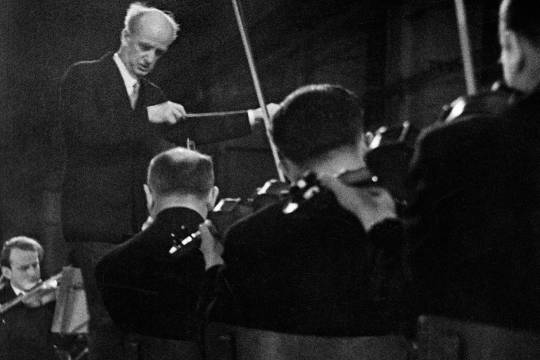
This was calculated to offend the conductor Wilhelm Furtwängler who had previously ruled the roost in the same theatre. Karajan was set up as a pawn in the struggle for control of Berlin’s cultural institutions between Propaganda Minister Joseph Goebbels, a Furtwängler supporter, and Minister of Interior Hermann Goering, the patron of the Berlin State Opera.
In June 1939 Karajan conducted Wagner’s Die Meistersinger at the State Opera without a score. The performance collapsed when the baritone, a drunk Rudolf Bockelmann, made a serious error. Alas Hitler, in the audience, was furious, blaming instead Karajan’s insufficiently Germanic approach to Wagner by conducting from memory.
Further problems arose over his marriage in 1942 to the quarter Jewish Anita Gütermann, technically against the law.
Yet, despite this and the continuing hostility and suspicion of Goebbels and Hitler and Furtwängler’s jealousy, his career prospered during the war. He conducted Bach’s B Minor Mass in Paris for the occupying German soldiers in 1940 and returned to the French capital in 1941 to present his performance of Tristan with the Berlin State Opera.
From 1940 he appeared in Italy and gave concerts in Romania and Hungary. A major achievement was to secure popularity for Orff’s Carmina Burana, a score that had aroused some hostility from the Nazi hierarchy at its first performance in 1937 before Karajan’s performances in Aachen and Berlin during the early 1940s.
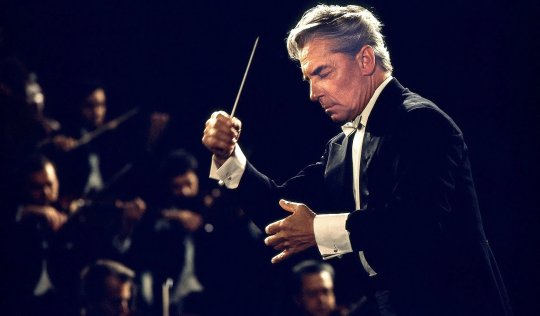
Driven by a fanatical love of music and a desire to advance his career, there’s little doubt that Karajan’s involvement with the Nazi regime was opportunistic.
Doubtless though there were also areas of Nazi policy that may well have chimed in with his own views. At the same time falling foul of the regime on occasions, his personal ideology can be best described as a montage of greys; nothing is ever clear-cut and nor perhaps should be our assessment of his work.
#karajan#herbert von karajan#quote#conductor#music#german#nazi germany#nazism#opera#orchestra#classical music#history#arts#culture
37 notes
·
View notes
Text

The wonderful German soprano Marta Fuchs (1898-1974) in Glucks „Iphigénie en Tauride“ at the Dresden Opera in 1937. Karl Böhm conducted, her partner was Mathieu Ahlersmeyer (1896-1979).
#Marta Fuchs#Fuchs#dramatic soprano#soprano#Iphigénie en Tauride#Christoph Willibald Gluck#Gluck#Mathieu Ahlersmeyer#Ahlersmeyer#opera#classical music#music history#bel canto#composer#aria#classical composer#baritone#dramatic baritone#chest voice#opera singer#classical singer#classical singing#classical#singing#operatic singing#operatic soprano#operatic baritone#operatic singer#singer#music
11 notes
·
View notes
Text
Primo spicchio della Luna crescente questa sera, si staglia sullo skyline di città alta, alla radio ascolto la sinfonia No. 9 in D Minor, Op. 125 "Choral": IV. Finale di Ludwig van Beethoven eseguita dalla Filarmonica di Vienna, Karl Böhm & Chor der Wiener Staatsoper.
Mentre vedo gente sui balconi cercare quel refolo d’aria che ancora tarda nel farsi trovare. Tra ventagli e sigarette che aspirate sembrano le lucciole che una volta trovavo nei campi. Che non esistono più. Solo case e strade asfaltate oggi.
I miei pensieri per un po’ li tengo sospesi mentre osservo e mi racconto ciò che i miei occhi vedono. Al fresco dell’aria climatizzata nella mia auto. Viaggio in una città semi deserta. E penso, anche agli ultimi avvenimenti che riempiono il la mia testa. Mi chiedo quanto possa starci in questa mia capoccia.
Radio Marconi è una bella emittente.
Sono anche passato da mia madre, per darle la buonanotte e le ultime attenzioni prima che si corichi. Mi ha detto che sto bene vestito di nero.
Spero che arrivi presto un temporale a rinfrescare quest’afa e questa mia anima arsa.
#libero de mente#pensiero#frase#città#luna#sera d’agosto#caldo#afa#madre#ludwig van beethoven#auto#pensieri#racconto#vita
4 notes
·
View notes
Text
youtube
Wolfgang Amadeus Mozart/Berliner Philharmoniker · Karl Böhm, Symphony No. 4 in D Major, K. 19: II. Andante I Mozart, W.A.: 46 Symphonies, 1969
0 notes
Text
13 NOVEMBRE 2024
Programme de brumaire poétique, brumeux et redondant.
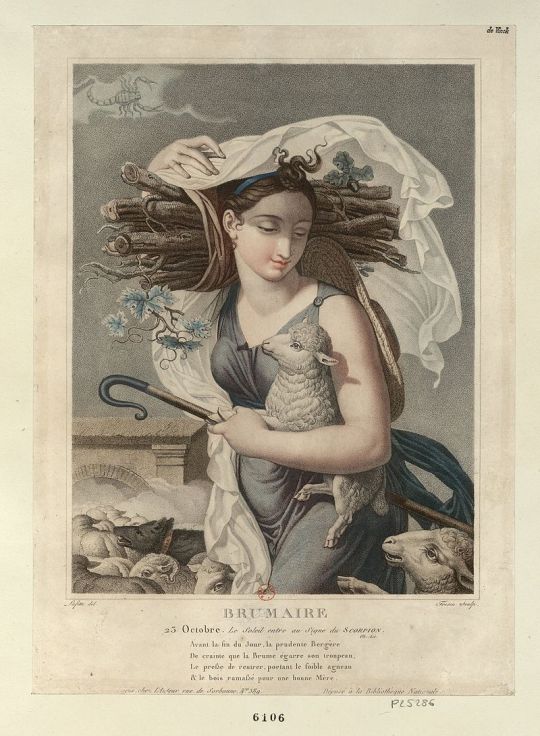
1°) Bouts-rimés sans échauffement (10 minutes pour un dizain) : Un petit poème ? Il n’y a plus qu’à l’écrire, voici les rimes, dans l’ordre, ou le désordre, peu importe : accroupis/tapis ; brume/plume ; dédaigne/saigne ; étranger/danger ; souplesse/diablesse. Il sera préférable d’écrire des vers mesurés, c’est-à-dire de longueur régulière.
Vois-tu ces vieillards accroupis En prière sur leurs tapis ? Pour les dépeindre, prends ta plume, Vide ton esprit de sa brume, Laisse parler ton cœur qui saigne, Bien loin du fou qui les dédaigne. Crois-tu vraiment que l’Étranger Pour ton pays soit un danger ? Laisse aller ta main en souplesse, Et que ton encre soit diablesse !
2°) Quelques haïkus pour changer (5 minutes) : La courge. Contrainte : obligation d’utiliser une fois le mot « courge ».
Quel drôle de nom, Cette courge du Japon, Le potimarron. On creuse la courge, On y place une bougie, On y met le feu. Les enfants ont peur Qu’on les oblige à manger La soupe de courge. La soupe de courge ? Velouté de potiron, C’est mieux pour les bourges. Courge rubiconde, Tu mûris dans mon jardin. Gare à Halloween !
3°) Écriture mi-longue (10 minutes) : Critique littéraire. Rédiger un article de critique littéraire d’un ouvrage, avec une identification du genre, de l’auteur, et/ou un bref résumé et un commentaire sur le style, et/ou le contenu, l’intérêt de l’œuvre dans la production de l’auteur, etc. Au programme : La chanson du maître, Karl-Jonas Böhm, traduction Antonio Aldas, Éditions irrégulières, 2024.
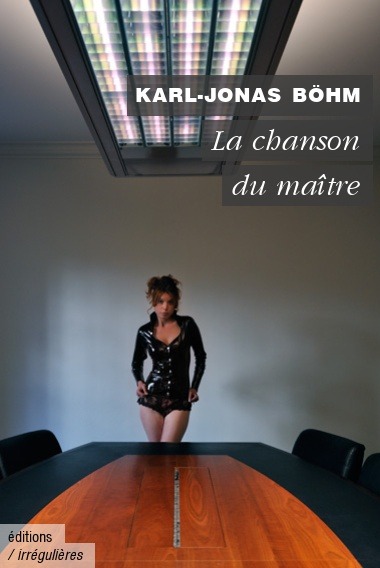
Karl-Jonas Böhm n’en est pas à son premier polar, et La chanson du maître enrichit davantage la saga norvégienne commencée voilà dix ans. Après Le Tableau vert et La salle des profs, c’est une nouvelle enquête de l’inspecteur Langström qui se situe dans le monde scolaire. Le sujet est à la mode, le harcèlement, mais Böhm l’a subtilement renouvelé en le renversant. La proviseure est dominatrice, les conseils de classe sont olé-olé, et trois meurtres consécutifs dans le gymnase, en un mois, c’est un peu trop. Écriture suggestive, rebondissements scabreux et critique sociale font le sel de ce dernier roman. La classe politique provinciale de Bergen en prend pour son grade : municipalité corrompue, dessous de table, chantage et conséquences psychologiques désastreuses, les portraits ne sont guère flatteurs. Mais l’humour, bien que noir, y est très présent. Un des conseils de discipline, notamment, est désopilant. Et les aventures des surveillants d’internat sont pittoresques. Que l’on se rassure : Langström finit toujours pas arrêter le – ou les – coupables, et ses frasques sentimentales en font quelqu’un de très humain. Lecture recommandée, mais pas pour les collégiens : ils y puiseraient de mauvaises idées.
4°) Amorce pour une histoire en 6 lignes et 6 minutes. « Il est vieux et ressemble à un chien. »
Il est vieux et ressemble à un chien, son caractère grognon et sa façon d’aboyer ses reproches à son entourage ont fini par éloigner même ses plus anciens amis. Solitaire et agressif, il est redouté même du facteur qui lui apporte sa pension, et les enfants du quartier se tiennent à une distance respectueuse et craintive. Mon père, décidément, commence à me poser problème.
5°) Une image pour une histoire (10 minutes) : La brume et son mystère. Voici une photo de paysage suisse et brumeux (© Futura Sciences). On inscrira un petit mystère au sein de cette image, en une dizaine de lignes, soit narration, soit description.
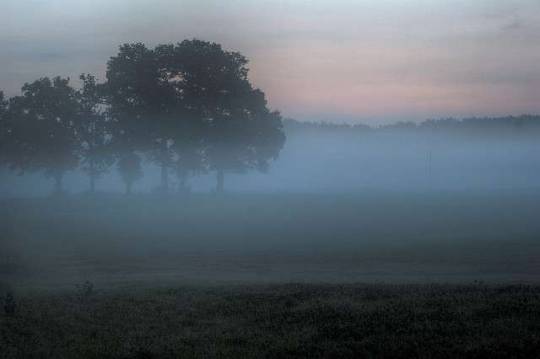
C’est juste avant le bouquet d’arbres que je l’ai perdue. Elle allait bon train, emmitouflée dans sa doudoune gris clair, et chantonnait comme pour me narguer. « Attrape-moi si tu peux, attrape-moi si tu veux… » La prairie s’étendait devant nous, et peu à peu la brume était montée des herbes humides où je suivais la trace de ses bottines, trop loin derrière mais plein d’espoir après les promesses qu’elle m’avait faites l’après-midi à la récréation. Moi, j’y croyais sincèrement, naïvement. Mais arrivé au pied du bosquet de chênes, face à ce mur impénétrable et opaque, je me suis arrêté. J’ai appelé, appelé, j’ai attendu que le vent dissipe cette brume qui m’avait fait perdre Maryline. Je n’ai jamais su comment elle avait disparu. J’attends encore…
0 notes
Text
Old Vienna

Hans Holt
(* 22. November 1909 in Wien als Karl Johann Hödl; † 3. August 2001 in Baden bei Wien)

war ein österreichischer Schauspieler.
Der Sohn des Glasermeisters Karl Hödl und seiner Frau Paula geb. Schmider besuchte in seiner Heimatstadt die Bundesrealschule am Donaukanal.
Er absolvierte die Akademie für Musik und darstellende Kunst Wien und debütierte 1930 am Volkstheater.
Er spielte danach auch am Wiener Burgtheater und in Zürich und in Berlin. Dem Theater in der Josefstadt gehörte er mehr als vierzig Jahre an.
Wenige Jahre nach seinem Schauspieldebüt wurde er 1935 für den Film entdeckt, seine ersten beiden Rollen spielte er noch in diesem Jahr als Karl Hödl in zwei Emigrantenproduktionen. Dort war sein Rollenfach der fesche junge Mann, der mit sympathischer Gutmütigkeit das weibliche Publikum eroberte.
An der Seite von Paula Wessely, Attila und Paul Hörbiger sowie Hans Moser spielte Hans Holt in insgesamt mehr als achtzig Heimatfilmen und Lustspielen.
Neben seinen Filmrollen trat er auch in Stücken von Hugo von Hofmannsthal, Arthur Schnitzler und Franz Molnár auf.
Außer am Theater in der Josefstadt wirkte er bei Gastspieltourneen an anderen Bühnen mit. Er schrieb auch selbst mehrere Theaterstücke.
Eine seiner letzten großen Bühnenrollen war der "Himmlische Konzipist" in MolnársLiliom bei den Berndorfer Festspielen unter der Intendanz von Felix Dvorak.
In späteren Jahren wurde er vor allem Fernsehschauspieler. 1973 war er in 13 Folgen an der Seite von Marika Rökk in der Familienserie 'Die Schöngrubers' zu sehen.
Anfang der 1980er Jahre spielte Hans Holt in der Fernsehserie 'Ich heirate eine Familie' sowie in der jeweils samstags ausgestrahlten ORF-Stegreifspielserie 'Die liebe Familie'.
1985 bis 1989 wirkte er als Franz an der Seite von Alfred Böhm in der 26 Episoden langen Serie 'Der Leihopa' mit.
Zu seinen Eigenheiten gehörte ein gedämpfter und leicht näselnder Kammerspielton. In früheren Filmrollen gab er oft Gesangseinlagen.
Hans Holt war seit 1936 mit dem ehemaligen Scriptgirl Renate Bremer verheiratet. Die einzige Tochter starb 1945 im Alter von zwei Jahren. Hans Holts Grabstelle liegt auf dem Neustifter Friedhof. (Gruppe H, Reihe 6, Nummer 23)

Hans Holt erhält von Bürgermeister Franz Jonas die Josef-Kainz-Medaille (26.11.1964)
0 notes
Text
Beethoven ・ Symphonie No.6 ・ "Pastorale" Wiener Philharmoniker ・ Karl Böhm
I have been so full of my comparisons that I have not yet said what immense pleasure the Neuchâtel concert gave Gertrude. It was actually the Pastoral Symphony that was being played. I say actually because, as will be easily understood, there is no work I could have more wished her to hear. For a long time after we had left the concert room, Gertrude remained silent, as though lost in ecstasy. "Is what you see really as beautiful as that?" she asked at last. "As beautiful as what, dear child?" "As that 'scene on the bank of a stream'?" I did not answer at once, for I was reflecting that those ineffable harmonies painted the world as it might have been, as it would be without evil and without sin, rather than the world as it really was. And I had never yet ventured to speak to Gertrude of evil and sin and death. "Those who have eyes," I said at last, "do not know their happiness." - André Gide, ⟨ La Symphonie Pastorale ⟩ 中
0 notes
Text
1 note
·
View note